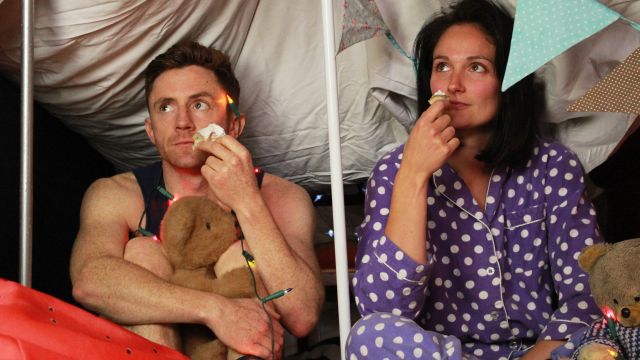Sunday’s Roast
Just as 57-year-old Felicity (Ruth Katerelos) discovers she’s pregnant - how embarrassing – at her age - her grown-up children start arriving for Sunday lunch. It’s an idea with potential. Unfortunately the play does little with it. There’s the elder daughter, bossy-boots Emily (Jennifer Monk) and her mild, obliging husband Andrew (James Rosier). Mike (Pat Moonie) is the middle child; he’s with his fiancée Melanie (Lee McClenaghan) who’s largely oblivious to Mike’s misery – and the wedding is imminent. Finally, there’s Bonnie (Shanon Kulupach) the pretty cheerful youngest who’s announcing today that she’s bi-sexual. The others bring with them their discontents, their conflicts and uncertainties. Apart from Bonnie, they all have trouble reconciling who they are with what they want. Later, Bonnie’s current partner, Rhiannon (Lucinda Barratt) shows up – although she has practically nothing to do but show that Bonnie is, indeed, a lesbian - currently. Later still, a surprise addition (Russell Williamson) bursts in, to Felicity’s profound embarrassment.
A more or less naturalistic family drama is rare these days, but Tim P Driver’s play takes us into Mike Leigh or Alan Ayckbourn territory. (Or Ayckbourn as filmed by Resnais with blatant artificiality? Does this play belong on television?) Mr Driver says that he wants ‘to explore that fly-on-the-wall feeling that you can only create with this kind of theatre’. Part of the concept of ‘this kind of theatre’ is the set (design by Nick Casey): it’s a wall-less house: living-dining area downstage, kitchen, bathroom, bedroom up some steps and then a roof balcony at the top, way upstage.
Scenes play out in all these spaces, but, apart from blackouts to signal the passage of time, the stage stays lit so that there’s something going on (in dumb-show) all over. Mr Driver calls it an ‘active set’ so the audience can follow ‘what [they] wish to’. Why a playwright and director would want to allow an audience this freedom – and diffusion of focus – is difficult to understand, but in any case, it doesn’t work. While, say, Andrew and Bonnie are smoking pot on the roof, or Felicity and Mel are talking through the (non-existent) bathroom door, there really isn’t anything much of interest going on elsewhere – so the ‘active set’ is only a distraction.
Meanwhile, the text feels strained, searching for its humour, trying to convince us that this is a comedy. A string of jokes about a cheese-less cheesecake, for instance. Indiscreet talk after too much to drink. Maybe what the show needs is for Emily’s bullying to be really vicious, mean and humiliating because accurate. It needs Melanie’s preoccupations to be so breath-takingly selfish so that fiancé Mike could kill her – but he won’t: he’s trapped. It needs Felicity’s anxiety about her possible pregnancy to paralyse her with terror. Ms Katerelos plays it as a mild worry, a distraction, more to do with what her children think than with the prospect of being a mother again – and with that man.
These text issues leave the cast floundering a little (even the usually wonderful Ms Monk), pushing too hard to be ‘funny’. How fatal is it when the actors are all too conscious that they’re in a comedy – so better act funny! You sense they could all be much better with a more decisive text and more solid characters. The only exception is Mr Moonie, who has that often unappreciated ability to appear to be not acting at all – just ‘being’ the character. As a consequence, his Mike has a real quiet pathos. Everyone does gets their moments, their chance to air their grievance, but the moments play out in turn and don’t go anywhere.
After five years (off and on, I’m sure) of development by Mr Driver and Ms Monk, Sunday’s Roast really should be better. It’s not a bad concept, but it is neither funny (or absurd) enough for comedy just as the characters’ woes are really not so tragic. We don’t laugh much, but we don’t feel much either.
Michael Brindley
Subscribe to our E-Newsletter, buy our latest print edition or find a Performing Arts book at Book Nook.

